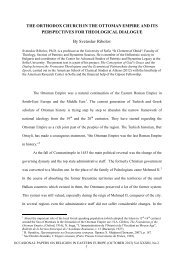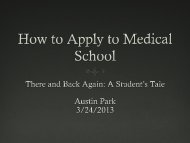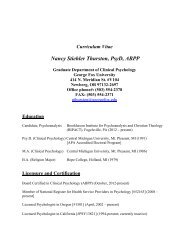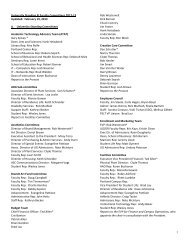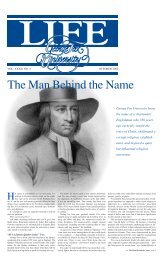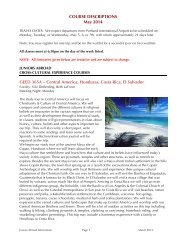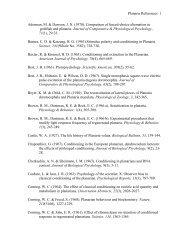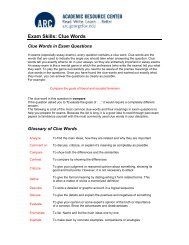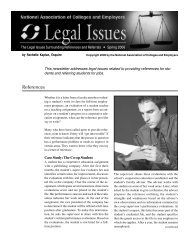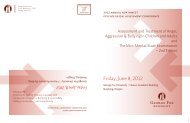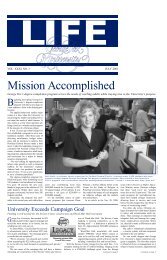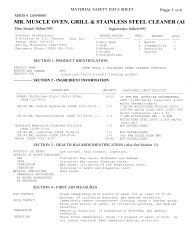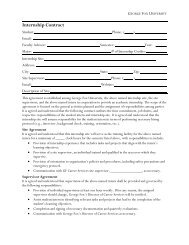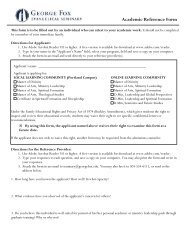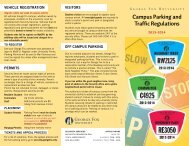JUNIORS ABROAD FACULTY HANDBOOK - George Fox University
JUNIORS ABROAD FACULTY HANDBOOK - George Fox University
JUNIORS ABROAD FACULTY HANDBOOK - George Fox University
Create successful ePaper yourself
Turn your PDF publications into a flip-book with our unique Google optimized e-Paper software.
<strong>JUNIORS</strong> <strong>ABROAD</strong><br />
<strong>FACULTY</strong> <strong>HANDBOOK</strong><br />
GEORGE FOX UNIVERSITY<br />
Paul Chamberlain, Director of Juniors Abroad
Table of Contents<br />
TIME-LINE 2009-2010.................................................................................................................................. 1 <br />
ACADEMIC REQUIREMENTS....................................................................................................................... 2 <br />
STUDENT ELIGIBILITY .................................................................................................................................................2 <br />
DISCIPLINE...................................................................................................................................................................2 <br />
CANCELLATION OF TRIPS ............................................................................................................................................3 <br />
FINANCIAL .................................................................................................................................................. 3 <br />
STUDENTS....................................................................................................................................................................3 <br />
<strong>FACULTY</strong> .....................................................................................................................................................................3 <br />
PAYING BILLS..............................................................................................................................................................3 <br />
GROUP SIZE ................................................................................................................................................ 5 <br />
<strong>FACULTY</strong> LEADERS ...................................................................................................................................... 5 <br />
PASSPORTS .................................................................................................................................................. 5 <br />
TRAVEL ARRANGEMENTS ........................................................................................................................... 6 <br />
AIRLINE RESERVATIONS..............................................................................................................................................6 <br />
RAIL RESERVATIONS ...................................................................................................................................................6 <br />
ACCOMMODATION RESERVATIONS .............................................................................................................................7 <br />
RESOURCES ................................................................................................................................................. 7 <br />
INTERNATIONAL STUDENT IDENTITY CARDS AND INSURANCE............................................................ 7 <br />
CELL PHONES .............................................................................................................................................. 8 <br />
INTERNATIONAL DIALING......................................................................................................................... 8 <br />
OPERATION OF MOTOR VEHICLES ........................................................................................................... 8 <br />
SAFETY POLICIES AND PROCEDURES ........................................................................................................ 9 <br />
GOALS .........................................................................................................................................................................9 <br />
SAFETY EDUCATION ....................................................................................................................................................9 <br />
DOCUMENTATION........................................................................................................................................................9 <br />
IN CASE OF EMERGENCY ...........................................................................................................................................10 <br />
EMERGENCY COMMUNICATION PROTOCOLS.............................................................................................................10 <br />
RESPONSIBILITY AND LIABILITY STATEMENT ...........................................................................................................11 <br />
DAILY CHECK-IN .......................................................................................................................................................11 <br />
EXCHANGING MONEY ...............................................................................................................................................11 <br />
TRAVEL IN DEVELOPING COUNTRIES ........................................................................................................................11 <br />
US STATE DEPARTMENT WARNINGS .........................................................................................................................11 <br />
MEDICAL ELIGIBILITY OF STUDENTS.........................................................................................................................11 <br />
MEDICAL REQUIREMENTS .........................................................................................................................................11 <br />
APPENDIX A - SAMPLE BUDGET............................................................................................................... 12 <br />
APPENDIX B - AGREEMENT OF RESPONSIBILITY AND LIABILITY........................................................... 13 <br />
APPENDIX C - EXAMPLE OF NOTES TO STUDENTS ABOUT THE TRIP.................................................... 14 <br />
APPENDIX D - FINAL ITINERARY............................................................................................................. 16 <br />
Appendix E - INTERNATIONAL DIALING INSTRUCTIONS...................................................................... 18 <br />
APPENDIX F – SAMPLE EXPENSE REPORT................................................................................................. 19 <br />
APPENDIX G - GFU FOREIGN TRAVEL PROGRAM PLANNING CHECKLIST ........................................... 20 <br />
Faculty Handbook – Revised September 2009<br />
Page i
TIME-LINE 2009-2010<br />
September/October - You need to finalize budgets for the trips so that we can settle on the student cost for<br />
each trip. By the end of October, you should be well along in arranging for airline transportation. (Note:<br />
class lists at this time are VERY tentative, and will change dramatically by next January. Please, do not<br />
contact students at this time without talking to me.)<br />
November - Send me a copy of your projected trip budget and preliminary itinerary by November 1, or<br />
earlier. It should include line items for overseas airfare, ground transportation, lodging, meals, and other<br />
costs (such as admissions and tours). See example in appendix A. This will allow us to settle on student costs<br />
for each trip. A memo is sent to each Juniors Abroad student which becomes our commitment of costs to<br />
students. Please note that we cannot change these costs after this memo is sent. SO IT IS VERY<br />
IMPORTANT THAT YOU BUDGET IS REALISTIC AND TAKES INTO ACCOUNT EVERYTHING.<br />
Due: November 1 –<br />
Trip budget due – PLEASE – IT IS ESSENTIAL TO HAVE THIS IN BY THIS DATE<br />
Preliminary Itinerary<br />
I will be sending the students a large packet of information around the first of November with sign-up<br />
instructions and cost information and will have a general information meeting with them to answer<br />
questions on November 15 (tentatively). I will send a copy of this information to each of you. This<br />
information will also be posted on the Juniors Abroad website.<br />
December - Students will confirm registration for Juniors Abroad. Class lists can change dramatically<br />
between the time school ends and when it begins in January. Again it is best not to contact students until<br />
the first week of school in January.<br />
January/February - A $300 non-refundable deposit is required for each student by January 15, 2010. If a<br />
student does not have their deposit, deposit form, ISIC application, and a copy of their passport by this date<br />
they will be removed from the class list. Students will expect to meet the first week of classes. A typical<br />
class meets 8-10 times during spring semester. At this point I need a copy of your final syllabus. Please<br />
remind the students that their student accounts (except for Juniors Abroad or if they are on a payment<br />
plan) must be paid in full by February 15.<br />
Due February 1 –<br />
Course syllabus<br />
March /April - Half of the remaining trip balance is due March 1 and the remainder is due April 1. It is<br />
essential that each student pays in full, or makes arrangements with student accounts by April 1. If they<br />
cannot pay on these dates they MUST contact student accounts to make other arrangements or they will be<br />
removed from the course. All final money requests must be turned in by April 9.<br />
Due April 9<br />
Final Budget<br />
Final Itinerary<br />
FINAL MONEY REQUESTS<br />
May - Trips typically leave the Monday - Wednesday of the week after graduation.<br />
After the trip, return all money, receipts, and final expense report to me.<br />
I will send you a spreadsheet.<br />
Due upon return<br />
Final Expense Report<br />
All receipts<br />
All extra money<br />
Any additional check requests<br />
Faculty Handbook – Revised September 2009 Page 1
ACADEMIC REQUIREMENTS<br />
Each Juniors Abroad group is expected to meet a minimum of eight to ten times during the spring semester<br />
to prepare students for the trip. All classes are scheduled for 6:30 – 9:00 pm M – Th. Academic<br />
requirements should include readings and might include, written reports, oral reports, quizzes, exams, etc.<br />
Besides the obvious academic topic, the course should introduce the students to the cross-cultural aspects<br />
of the trip and help prepare the group for travel and for what they will see. It is important to talk about<br />
sites that you will visit. Students especially appreciate learning about the history, culture and people they<br />
will be visiting. It is also important to prepare students for traveling in a foreign country, ie, things will be<br />
DIFFERENT and will NOT always go according to plan. Typically, journals are required of all students that<br />
are read by the faculty leaders at the end of the trip. There should also be required group activities on the<br />
trip.<br />
In summary the class time during the spring semester should include the following:<br />
Academic content<br />
Discussion of sites to be visited<br />
How to travel, packing – see safety and traveling tip handbook<br />
Traveling logistics<br />
Cultural differences<br />
Students are expected to travel to your destination with the group, and to remain with the group the entire<br />
time, unless there is some unusual circumstance. A number of students each year opt to stay longer. They<br />
need to communicate this to you as soon as possible, and they are responsible for any additional costs.<br />
Juniors Abroad can be used for General Education Global and Cultural Understanding credit. Some students<br />
may request that they earn credit toward other requirements. This must be done by special petition and<br />
receive approval from the Dean of the appropriate school and the academic area credit will be earned. The<br />
course is graded A – F.<br />
Students must be earning a minimum grade of a C- to be eligible to participate in the travel portion of the<br />
course. If they do not participate in the trip, they will earn a grade of F. There will be no refund at this<br />
point.<br />
Student Eligibility<br />
Any current junior or senior is eligible if they have a minimum 2.00 GPA, and are in good standing with the<br />
Student Life Office. (See catalog for complete list). Juniors have priority. Seniors can participate but they are<br />
automatically placed at the bottom of the waitlist (if there is one). Transfer students also are eligible, but<br />
must pay a "buy in" fee depending on the number of semesters that they attend <strong>Fox</strong>.<br />
Discipline<br />
Students are expected to abide by all GFU standards on the Juniors Abroad trips. Faculty have the authority<br />
to send students home early, BUT this option should be used only in extreme circumstances. Talking to the<br />
student and reporting their behavior to student life upon your return are options. You should take the GFU<br />
lifestyle agreement seriously. (See Student Responsibility and Liability Agreement in Appendix B). Please<br />
discuss this with students BEFORE you leave. In particular make sure that they understand the following.<br />
In the interests of the entire group, the appointed faculty of GFU reserve the right to send<br />
a person home at that person’s expense for reasons of disciplinary action or if the person<br />
is unable due to injury, illness, or other circumstances, to maintain the tour itinerary. The<br />
faculty/director of Juniors Abroad also reserve the right to lower the grade, or fine a<br />
person, up to an amount equal to the <strong>University</strong>’s cost for the trip, for behavior outside of<br />
the GFU lifestyle statement.<br />
Faculty Handbook – Revised September 2009 Page 2
NEW POLICY – If some one is caught in an act that is contrary to the lifestyle statement<br />
the following policy will be followed:<br />
• the students grade will be lowered by one full grade<br />
• the infraction will be reported to the student life office<br />
• the faculty member(s) will meet with the Director of Juniors Abroad to discuss any<br />
further penalties.<br />
Cancellation of Trips<br />
Trips can and should be canceled if there is undo concern about the safety of students due to political, or<br />
other serious safety issues.<br />
FINANCIAL<br />
Students<br />
Students will receive a Juniors Abroad bill in their spring statement from the university. They must pay at<br />
least the non-refundable $300 deposit by the due date in January, half of their bill by March 1 and the entire<br />
amount by April 1. There can be exceptions to this if the student makes special arrangements. All<br />
payments are non-refundable. If a student does not pay the entire amount before the trip departs, they<br />
will not be allowed on the trip. No exceptions.<br />
The total cost of a trip should be no more than $3600. In rare circumstances exceptions can be made.<br />
Student costs are typically between $1500 - $2000. Other costs the student may incur are souvenirs,<br />
optional entrance fees, etc. Typical spending money is $200 - $400. If the student is required to do<br />
something (ie. go to a museum), the trip costs for these activities should be included. Every attempt should<br />
be made to keep the cost of the trip as low as possible. However, we also want the students to enjoy their<br />
experience, so it is important that they have a minimum level of comfort. Typically, 2 star hotels, good<br />
quality youth hostels, or similar accommodations are appropriate.<br />
Faculty<br />
For faculty trip leaders, the college covers travel expenses and pays a modest stipend. The budget is for<br />
$3000 per trip. This amount is typically divided $1500 per faculty member or $2000 for the primary faculty<br />
member and $1000 for the secondary faculty member.<br />
Paying Bills<br />
PLEASE, ALWAYS send money requests directly to me, NOT to the Financial Affairs office. Please email all<br />
check requests or wire transfers directly to me. PLEASE INCLUDE AN INVOICE WITH ALL CHECK AND<br />
WIRE TRANSFER REQUESTS. I cannot submit your requests to the financial affairs office without an<br />
invoice. If they are electronic, just email them with your request. If they are not electronic, mail them to<br />
me. These can be an actual invoice or an email with the name of the company and the amount. ALWAYS<br />
send me an electronic copy of the check request or wire transfer.<br />
We also have a new accounting procedure and new cost center numbers.<br />
The new numbers will be 00190110-365X where X is the section for your course. This way we can keep<br />
track of all expenses by course. You also need to enter ALL expenses into the expense report sent to you.<br />
There are several ways to pay bills and trip expenses:<br />
ATM withdrawals Once on the trip this is the desired method of obtaining large amounts of money in<br />
foreign countries. The <strong>University</strong> is willing to advance you the amount needed for your trip. You<br />
Faculty Handbook – Revised September 2009 Page 3
can then withdraw from your account from an ATM almost anywhere in the world. You will need<br />
to keep accurate records and receipts for the money that you withdraw and spend.<br />
Typically banks limit your daily withdrawals. However, you can talk to the bank BEFORE you<br />
leave and, usually, they will be able to raise the daily limit, possibly to as much as $2000.<br />
Also, make sure that you check on the fees your bank charges. These can be quite high and<br />
may preclude using this method.<br />
Notify your bank to make sure that they do not cancel usage while you are abroad.<br />
VISA/MasterCharge You can also pay a bill with your credit card, send a check request and receipt to<br />
me and you will be reimbursed. Also if foreign currency is involved there is usually a currency<br />
conversion fee with each credit card use, up to 3%.<br />
Notify your credit card company to make sure that they do not cancel usage while you are<br />
abroad.<br />
Check requests Please send me a university check request, with receipts or invoice, explaining the<br />
charge and I will sign it and send it to the Financial Affairs office. Or send me the information and I<br />
will make out the check request. Please understand that this typically takes a week or so. Thus it is<br />
important to plan ahead and make sure that various travel agents are aware of this and give us<br />
enough time. Please send the check request electronically so that I can keep it for my records.<br />
Reimbursements For personal reimbursements please use the reimbursement request form. See check<br />
requests above for further information.<br />
Foreign Currency Please request foreign currency at least two weeks in advance as it takes time for the<br />
bank to process these. Send amount, in foreign currency (also give amount in USD), to me by email<br />
and I will process. You do not need a check request for this. You can request certain<br />
denominations, etc., but the bank may not be able to fulfill the request. PLEASE DO NOT CARRY<br />
MORE CASH THAN NECESSARY. Also realize that we do NOT get good rates from our local bank.<br />
Thus it is best to use ATM’s once you are in the country. If you are working though a travel agent<br />
in the country, you might consider having them get you some initial foreign currency.<br />
Foreign Wires and Drafts Please request foreign drafts one week in advance as it takes time for the<br />
bank to process these. Send wire transfer, with all of the information requested, to me via email or<br />
campus mail and I will process. For current currency conversion see www.travlang.com/money.<br />
Note that these are approximate to the actual rates as they vary according to time of day, bank, etc.<br />
Our rates are almost always higher. There is also a $15 wire fee for each wire transfer.<br />
Also list the amount in USD.<br />
Foreign Draft (check) Instructions<br />
• Send request (emails are fine) to me. I will forward the request to Financial Affairs.<br />
• Please translate where necessary - often foreign addresses are hard to understand.<br />
• Clearly mark check request Wire or Draft.<br />
• Clearly mark due date on the face of the check request.<br />
• The financial affairs office will return drafts (an international certified check) to you to<br />
process & mail, so that you have control & knowledge.<br />
Foreign Wire Instructions<br />
• Wires get the money there faster, but only if you collect ALL the information our bank<br />
requires to start with:<br />
Traveler Checks. Please do NOT use.<br />
Please have travel agents send bills to you or to me, NOT to the financial affairs office. The Financial<br />
Affairs office just sends them to me for approval. Again, emails of the invoice are fine.<br />
You will also be given a contingency fund for emergencies or unexpected expenses. This is typically $1000<br />
- $2000 and is usually returned at the end of the trip.<br />
Upon your return from the trip please bring the extra money, receipts, check requests, and FINAL<br />
EXPENSE ACCOUNTING REPORT to ME, not the Financial Affairs office. You must have receipts (where<br />
possible) for ALL money that was spent.<br />
Faculty Handbook – Revised September 2009 Page 4
I will send you a formatted spreadsheet for the Expense Report. Please use this for your final expense<br />
accounting.<br />
GROUP SIZE<br />
As a general guideline, the minimum group size should be 10 students. We are limiting enrollment for trips<br />
at 20. If you need to limit the size of your group to less than 20 let me know.<br />
<strong>FACULTY</strong> LEADERS<br />
Juniors Abroad is a program aimed at serving the needs and objectives of the undergraduate college at<br />
<strong>George</strong> <strong>Fox</strong> <strong>University</strong>. Professors teaching in the program should be traditional full-time undergraduate<br />
teaching faculty (with at least a half-time teaching load) under nine month contracts. For the benefit of the<br />
program, and at the discretion of the Director of Juniors Abroad, graduate faculty, individuals with faculty<br />
status, and faculty members with 11 month contracts may be considered for a secondary teaching position<br />
in the Juniors' Abroad program. (In keeping with <strong>University</strong> policy, individuals who are on 11-month or 12-<br />
month contracts are required to take vacation or leave for the time they are involved in the Juniors Abroad<br />
experience.) (In rare circumstances <strong>George</strong> <strong>Fox</strong> full-time staff can fill in as the secondary faculty.)<br />
Each trip is required to have two faculty leaders. Faculty leaders are required to make all arrangements for<br />
the trip, with the help of the Director of Juniors Abroad. As always faculty are responsible for the academic<br />
content of the course. Faculty are also responsible for the care and feeding of students on the trip.<br />
Each faculty member can be accompanied by one other member of their family, age 10 or older. The cost<br />
for a family member is the full cost of the trip. The full amount needs to be sent to me, no later than April 1.<br />
The family member then receives all benefits as if they were a student. Please be aware, even though the<br />
family member is allowed to accompany a group, the primary responsibility of the faculty member is for<br />
the students.<br />
PASSPORTS<br />
NOTE: We instituted a NEW policy for passports this past year.<br />
Students must turn in a copy of their passport with their deposit and deposit form no later than<br />
January 15, 2010.<br />
If a student does not have a passport they will be removed from the course and trip.<br />
•If the course has a waitlist the student will be placed at the bottom of the waitlist. The student<br />
will still need to produce a valid passport OR proof that the passport application has been<br />
submitted by January 25, or they will be dropped from the waitlist and the course permanently.<br />
(Note when a student is put at the bottom of the waitlist they are no longer on the trip and cannot<br />
get back onto the trip until the students above them have been enrolled. This may or may not<br />
happen.)<br />
• If the course does not have a waitlist the student must produce a valid passport OR proof that<br />
the passport application has been submitted by January 25 ,or they will be dropped from the<br />
course permanently.<br />
This new policy requires that you to apply for your passport and have it in hand by the first of<br />
January. To allow processing time by the government, this means that you must apply for your<br />
passport no later than October 1, 2009.<br />
This new policy is designed to relieve stress for both students and faculty. We have consistently<br />
had problems with students not getting their passports in time for the trip, or in time to obtain<br />
Faculty Handbook – Revised September 2009 Page 5
necessary visas. Some students have missed going on the trip due to not receiving their passport<br />
in time.<br />
If you are unsure whether you are actually going on a trip by October 1, you will still need to get<br />
a passport “just in case”. With the new requirements for passports for Mexico and Canada, it is a<br />
good idea for everyone to have a passport.<br />
PLEASE encourage students to get this done as soon as possible. Every year we have students who barely<br />
make it. Often the most difficult step is obtaining the birth certificate. They can rush the passport process,<br />
but it costs another $30 or so. Also be aware of any VISA's required for your travel. Foreign students often<br />
need VISA's to countries that US students do not. This can take considerable time and thus should be done<br />
as soon as possible. Please communicate this to any foreign students. It is their responsibility to obtain<br />
these VISA's.<br />
Passport applications for U.S. citizens will be available from Lynn Scott, in AAO. Detailed instructions and<br />
lists of charges are on the passport application. Students must have an official copy of their birth certificate<br />
and two passport photos. Students will need to turn in their applications and show the supporting<br />
documentation at one of the official passport offices; the closest office to Newberg is the Dundee Post<br />
Office, 279 SW 5th Ave. Dundee (8:00am- 12:30pm M-F, 10:00am-11:30am Saturday). Photos are also<br />
available at the Dundee Post Office. Passports can also be submitted at the Yamhill County Courthouse<br />
(535 E. 5th, McMinnville, Oregon, phone 1-503-472-9371). Photos can be taken at any place that does<br />
passport photos.<br />
TRAVEL ARRANGEMENTS<br />
Airline Reservations<br />
It is your responsibility to find a travel agent. You will find that this is a very important decision, which can<br />
either make your planning much easier or much harder. Please let me know about your experiences with<br />
various travel agents. We are always looking for good ones and would like to stay away from problems.<br />
Fellowship Travel International (FTI)- (www.fellowship.com or 1-800-235-9384) has been an excellent<br />
group to work with for airline reservations. Connie Gregory (cgregory@fellowship.com) has been very<br />
helpful with several of our groups and I highly recommend her. Several faculty have also had good luck<br />
with going directly to the airlines group desk.<br />
Be careful using the internet for airline reservations. In arranging air transportation, please be sure that all<br />
deadlines are clear; this includes deadlines for deposits, for surrendering seats without penalty, for final<br />
payment, itinerary changes, and penalties and costs for changes in tickets after these deadlines. There are<br />
always students who wish to stay longer and will ask for changes in return dates. Please make sure that this<br />
is allowed by the airline. DO NOT ALLOW STUDENTS TO CONTACT THE TRAVEL AGENT. This leads<br />
to confusion, for you, the student and the travel agent.<br />
Rail Reservations<br />
If you are going by rail in Europe or the British Isles you are required to use Alan R. Wissenberg of EurAide<br />
(see below for address, etc). Euraide is based in Munich Germany, but is run by Alan, who is an American<br />
and VERY knowledgeable about rail travel. In visiting with Alan in Munich a few years ago, I was very<br />
impressed with his expertise and helpfulness. He has since put together several trips and has saved us<br />
somewhere between $200 and $250 per student. You can send him an itinerary via email and he will make<br />
suggestions and give you a cost estimate. You can contact Alan at munichbased@yahoo.com. Euraide's<br />
website offers good information about rail passes etc.: www.euraide.de/<br />
NOTE: Alan is often very busy and difficult to contact. If that happens, you should also try Karen Murphy at<br />
Euraide ( euraide@verizon.net. , 781-828-2488, URL: http://www.euraide.com/ ) This office is located in the<br />
US and one group reported excellent service from Karen this past year.<br />
Faculty Handbook – Revised September 2009 Page 6
Online train schedules for all of Europe can be found at http://bahn.hafas.de/bin/query.exe/en. I have<br />
found this to be an excellent and accurate source of train schedules for Europe, including England.<br />
Accommodation Reservations<br />
Typically faculty make these themselves. It has become too costly to go through a travel agent. For<br />
example, one group was able to cut their per student per night costs from $60 to $30 by making reservations<br />
themselves. I would be willing to give you suggestions (we have hotels in some cities we use every year) but<br />
it is relatively easy to use an email to communicate with the various accommodations. You might consider<br />
the Your French Connexion (http://www.yourfrenchconnexion.com/) in Seattle. We have used them for<br />
accommodations in Europe and they have done a good job for us at a reasonable cost. They do charge<br />
you a reasonable amount for their time. If they work for you to find hotels that you do not use, they will<br />
still charge you for their time. They also say that they do NOT add anything to the cost of hotels for their<br />
services. All of this is to say I think they are good IF you use them. If you just use them to obtain<br />
information it is expensive.<br />
Begin booking accomodations early (September and October)as they seem to fill earlier every<br />
year.<br />
RESOURCES<br />
Each group has $100 to purchase travel books, etc. For Europe travelers I, and others, have found the<br />
Europe Through the Back Door books by Rick Steves to be especially helpful. Many of his accommodation<br />
suggestions often fit our type of trip. His books are also excellent resources for planning your trip. Lonely<br />
Planet is an excellent source for developing countries. Other resources include Frommers, and Lets Go<br />
travel books.<br />
INTERNATIONAL STUDENT IDENTITY CARDS AND INSURANCE<br />
All students will be required to obtain an International Student Identity Card (ISIC). These are available from<br />
Lynn Scott in AAO. This not only provides discounts on attractions, etc. (even in the US), but also provides<br />
emergency travel insurance. Note that this is a supplement to regular medical insurance which all students<br />
and faculty should have. Students are expected to check with their current medical insurance carrier to<br />
make sure that they are covered while traveling. Typically their parents insurance will cover them on these<br />
trips. If a student does incur medical expenses they need to keep any receipts to submit to their insurance<br />
company when they return. Card cost is included in their Juniors Abroad costs.<br />
Benefits Include:<br />
$250,000 Emergency Evacuation<br />
$25,000 Repatriation of Remains<br />
$10,000 Accident Medical Expense<br />
$5,000 Accidental Death & Dismemberment - Air<br />
$1,000 Accidental Death & Dismemberment - All Other<br />
$500 Lost Document Replacement<br />
$100 Per day Sickness & Hospital Benefit (up to 100 days)<br />
$100 Baggage Delay<br />
$100 Travel Delay<br />
Free - Travel Guard Assistance<br />
The insurance is valid only when an insured person is outside of their home country or country of domicile<br />
if different. There is also a toll-free emergency number available. You need to obtain the emergency travel<br />
number for the countries you will be traveling to.<br />
For more details on insurance, phone numbers, and discounts go to the following website.<br />
http://www.myisic.com/MyISIC/DiscountFinder/Home.aspx<br />
Faculty Handbook – Revised September 2009 Page 7
We will also be issuing cards for faculty at no charge to the faculty member.<br />
CELL PHONES<br />
All groups are required to carry a cell phone on the trip for emergencies. Phones will be provided by the<br />
<strong>University</strong>. These are typically for emergency use, but also might come in handy for checking on<br />
accommodations, etc. Faculty can use these to call home, but the cost is considerably higher (about $0.50 -<br />
$2.00/minute) than a phone card. STUDENTS ARE NOT ALLOWED TO USE THESE PHONES except in<br />
emergency.<br />
If you are traveling to a developing country it is quite likely that these phones will NOT work for making<br />
local calls. Thus you should plan on purchasing a local sim card for local calls and use this phone and sim<br />
card for call the US.<br />
INTERNATIONAL DIALING<br />
To dial internationally you must first dial the International Direct Dialing (IDD) prefix, ( This is unique for<br />
each country. For example to place an international call FROM the US this number is 011) followed by the<br />
Country Code (CC), followed by the number (including area code).<br />
For definitions and Country Codes see Appendix E.<br />
Dialing Examples:<br />
From UK to the US: 00-1-503-554-2702 (IDD = 00, CC = 1)<br />
From China to the US: 00 - 1-503-554-2702 (IDD = 00, CC = 1)<br />
From the US to France: 011- 33-334-221-1234 (IDD = 011, CC = 33)<br />
OPERATION OF MOTOR VEHICLES<br />
Operation of motor vehicles by students on Juniors Abroad trips is strictly forbidden.<br />
Faculty Handbook – Revised September 2009 Page 8
SAFETY POLICIES AND PROCEDURES<br />
Safety of our students is of up most concern as we travel around the world.. Always insist that students<br />
travel in pairs when they are not with the group. They may not do this, but it is important to warn them of<br />
the dangers of the particular area you are visiting. If they continually go off on their own in what you<br />
perceive as a dangerous situation you have the authority to send them home. See the Safety and Travel Tip<br />
Handbook for more information.<br />
Goals<br />
International travel experiences have been available to students at <strong>George</strong> <strong>Fox</strong> <strong>University</strong> for a number of<br />
years. These can be enriching times of learning and cultural exposure that create memories that last a<br />
lifetime. In an effort to ensure safe learning and growth experiences during international travel, the<br />
following policies and procedures have been established.<br />
The goals of this policy include the following:<br />
• To insure adequate training for faculty, students and other <strong>University</strong> personnel involved in travel<br />
abroad programs.<br />
• To develop an excellent communication system for use in emergencies where students, group<br />
leaders, <strong>University</strong> officials and parents are able to be fully informed in a timely fashion.<br />
• To limit <strong>University</strong> liability during international travel.<br />
The following policies and procedures must be reviewed and adhered to by students and <strong>University</strong><br />
employees alike, when traveling abroad. It is hoped that through following these policies, both students and<br />
employees will be able to remain safe as they travel in a wide variety of international settings.<br />
Safety Education<br />
Federal Law requires that all students be given “due warning” whenever there is a safety risk, be it on or<br />
off campus during a <strong>University</strong> sponsored event. In an effort to comply with this federal mandate for “due<br />
warning,” a travel safety booklet has been printed and will be made available to all groups involved in<br />
international travel. This booklet must be distributed to and read by all students. If students or leaders have<br />
any questions regarding the information contained, they should contact the Director of Juniors Abroad<br />
Also, the Director of Security is available to present to groups on the topic of safety when traveling abroad.<br />
This presentation can vary in length as the group leader wishes. In lieu of this presentation, group leaders<br />
may do their own safety training, but this training must occur and be documented as to when it was done.<br />
A Safety Handbook and Travel Tips Booklet for Juniors Abroad is to be distributed to all students.<br />
Documentation<br />
The following documents and information must be carried by each group member (faculty and students)<br />
traveling abroad on a <strong>George</strong> <strong>Fox</strong> <strong>University</strong> sponsored trip.<br />
1. Two passport photocopies; one for the student to carry with them (separate from their actual<br />
passport), and one to be left with the Academic Affairs Office. We will send each faculty<br />
member a copy of their students passports.<br />
2. Trip itineraries including all the participant names must be given to the Director of Juniors<br />
Abroad, who will distribute copies to the Academic Affairs Office, <strong>University</strong> Switchboard, and<br />
Security Services. Students should also provide a copy of the itinerary to their parents or<br />
guardians.<br />
3. The following information with travelers at ALL times.<br />
- phone numbers and addresses for all accommodations<br />
- phone numbers for all embassies or consulates of countries in which they are traveling.<br />
- phone number of <strong>George</strong> <strong>Fox</strong> <strong>University</strong> emergency contacts including international calling<br />
code<br />
- phone number for the groups cell phone (required for each group.<br />
Faculty Handbook – Revised September 2009 Page 9
A card designed to fit in a wallet will be issued to each student. An electronic copy of this will be<br />
distributed to faculty, who are responsible to fill out and distribute to the student.<br />
If there is a contact person in the country that is working with the study group, their name, telephone<br />
number, etc. and location should also be included on the itinerary.<br />
In Case of Emergency<br />
Be prepared for emergencies. Someone invariably will have to see the doctor or go to the hospital. The<br />
best source of information is typically the hotel. Usually it is much cheaper (often free) to go to the hospital<br />
than a private doctors office. If money is stolen or there are other emergencies for which you need help,<br />
please contact the <strong>University</strong>, either the Director of Juniors Abroad or the Academic Affairs office. It is good<br />
to communicate often with students, as they are not always good listeners.<br />
Group leaders need to communicate clearly where students should meet in the event of an emergency, civil<br />
unrest, terrorist attack or other political or cultural crisis in country. It is recommended that this meeting<br />
point be the current accommodation. The <strong>University</strong> is to be contacted immediately.<br />
Emergency Contact Numbers<br />
<strong>George</strong> <strong>Fox</strong> Academic Affairs – XX – 1 - 503-554-2140<br />
<strong>George</strong> <strong>Fox</strong> Security – XX- 1 - 503-554-2090<br />
XX = international direct dialing prefix. This is different for each country and is used to call FROM one<br />
country to another.<br />
1 = USA country code (to call to another country besides the US, you will need to know their country code)<br />
See Appendix E for further explanation<br />
Emergency Communication Protocols<br />
There are several lines of communication that need to be established in order for emergency information to<br />
be communicated effectively from one party to another. The following outlines the protocols for<br />
communicating information from one party to another.<br />
Parent to Student Notification<br />
In the event of an emergency, the parent may:<br />
1. Contact their student directly (the student must then contact the group leader), or<br />
2. Contact the <strong>George</strong> <strong>Fox</strong> <strong>University</strong> Academic Affairs Office. If that Office is unavailable,<br />
they should contact Security Services. <strong>University</strong> officials will then contact the study<br />
aboard group leader. The leader will get the information to the student as soon as possible,<br />
and assist the student in contacting their parents.<br />
Student to Parent Notification<br />
If the student has emergency information that needs to be communicated to the parent, they may:<br />
1. Contact the parent directly and inform the group leader, or<br />
2. Contact the group leader who will assume responsibility for getting information to the<br />
parent, either by contacting the parent directly or by contacting the <strong>University</strong> Academic<br />
Affairs Office, who will then contact the parent. (If the Academic Affairs Office is closed,<br />
the group leader should contact Security Services)<br />
Group Leader to <strong>University</strong><br />
In the event that a group leader needs to communicate information to <strong>University</strong> officials, the group<br />
leader should contact the Academic Affairs Office. If the Academic Affairs Office is unavailable, the<br />
call should go to Security Services, who will contact the appropriate <strong>University</strong> officials to work<br />
with the group leader.<br />
Faculty Handbook – Revised September 2009 Page 10
Responsibility and Liability Statement<br />
Every student traveling abroad on a <strong>George</strong> <strong>Fox</strong> <strong>University</strong> sponsored trip should read and sign the<br />
Agreement of Responsibility and Liability sheet. (Appendix B)<br />
Daily Check-in<br />
It is expected that leaders will check in with each student on a daily basis.<br />
Exchanging Money<br />
In the past, we have experienced large sums of money being stolen. One group leader was robbed of $4000<br />
on the subway in Paris. Trips to Europe are often the victims of pickpockets. Please do not carry more cash<br />
than absolutely necessary. It is recommended that both group leaders be present when large sums of money<br />
are exchanged, and that the money is distributed to students as soon as possible<br />
Travel in Developing Countries<br />
It is the responsibility of the group leader to check with appropriate sources about current conditions and<br />
safety in these countries.<br />
US State Department warnings<br />
<strong>University</strong> policy does not allow travel to countries with US State Department warnings. If there are other<br />
travel advisories, the faculty leader, in consultation with the Director of Juniors Abroad, is responsible to<br />
determine the seriousness of the advisory. The Governments web site for travel advisories and warnings is<br />
http://travel.state.gov/travel/cis_pa_tw/tw/tw_1764.html<br />
To get information about US embassies the web site is http://usembassy.state.gov/<br />
Medical Eligibility of Students<br />
Besides the academic and student life eligibility requirements (see <strong>University</strong> catalog) each student should<br />
be reviewed by the <strong>University</strong> Health and Counseling Center.<br />
The students will be asked to sign a release of medical information form. The <strong>University</strong> Health and<br />
Counseling Services will then review each student’s health record and determine if the student can safely<br />
participate in overseas travel. If there is concern for the student’s health the Student Health and Counseling<br />
Services will contact the Director of Juniors Abroad and determine, in consultation with the group leader,<br />
whether the student can safely fulfill the requirements of the study trip.<br />
Medical Requirements<br />
Group leaders should check with the <strong>George</strong> <strong>Fox</strong> <strong>University</strong> Health services to determine if there are any<br />
special medication or immunizations necessary for travel to the trips destination. The Center for Disease<br />
Control web site is another important source of information and should be consulted. You can also contact<br />
the Health Services for this information. You can also make arrangements with the health center for<br />
immunizations.<br />
Faculty Handbook – Revised September 2009 Page 11
APPENDIX A - SAMPLE BUDGET<br />
Juniors Abroad trip - Europe May 2000<br />
TRANSPORTATON<br />
Budget<br />
Airline, Northwest $810<br />
Rail, reservations and 2 couchettes, castle transport, $346<br />
Bath and Stonehenge $25<br />
London Visitors travel pass $32<br />
Paris Transportation $20<br />
Munich $15<br />
Rome $15<br />
London Transfer $17<br />
Transportation Total $1280<br />
LODGING No. of Amount per student<br />
Days per day<br />
Munich 3 $26 $79<br />
Rome 2 $37 $74<br />
Florence 3 $22 $66<br />
Chamonix 2 $25 $50<br />
Paris 4 $40 $160<br />
London 4 $36 $144<br />
Lodging Total $32(average) $573<br />
Days Amount/Day<br />
FOOD 20 $20 $400<br />
MUSEMUMS, etc.<br />
Amount<br />
Castle $10<br />
Freud $5<br />
Coliseum $7<br />
Vatican Museum $10<br />
Uffizi $8<br />
The Academia $8<br />
Grand Canal $3<br />
Paris Museums $30<br />
Dachau $2<br />
Natural History $3<br />
Play and dinner $40<br />
TIPS $3<br />
Luggage Storage, Venice and Salzburg $10<br />
Misc $50<br />
Misc Total $189<br />
Trip Total (per student) $2442<br />
Faculty Handbook – Revised September 2009 Page 12
APPENDIX B - AGREEMENT OF RESPONSIBILITY AND LIABILITY<br />
A. I understand that the <strong>George</strong> <strong>Fox</strong> <strong>University</strong> Travel-Related Study is a privilege. I understand that while<br />
participating in a Travel-Related Study I am to conduct myself in all matters of social and moral conduct<br />
as though I were a resident on the GFC Campus.<br />
B. I understand that the tour has been designed as an economical tour through taking advantage of local<br />
transportation and modest accommodations and that any individual additions to or deviations from the<br />
tour itinerary are may responsibility regardless of the reason. I further understand that the directors of the<br />
program are committed to assisting in any reasonable manner but will encourage independence and selfmotivation<br />
since they are necessary to the educational purpose of the trip.<br />
C. I understand that treatment for and any cost associated with any illness or personal injury incurred during<br />
the Travel-Related Study, regardless of the reason, shall be covered by me or my own medical or<br />
personal liability insurance.<br />
D. I further understand that the university will not be held responsible for:<br />
1. Loss, theft, or damage of personal property (including train passes and passports) at any time during<br />
the Travel-Related Study.<br />
2. Personal injury or illness incurred during the tour including but not limited to injury or illness<br />
incurred as a result of riding in any public conveyance (e.g. bus, ship, or aircraft) or as a result of<br />
natural disasters, war, or negligence not directly attributable to <strong>George</strong> <strong>Fox</strong> <strong>University</strong> or its duly<br />
appointed employees.<br />
3. Consequences of my own negligence, carelessness, or failure to follow <strong>University</strong> policy or<br />
instructions.<br />
E. I also understand:<br />
1. All arrangements for travel accommodations and other necessary services are made by the duly<br />
appointed faculty of <strong>George</strong> <strong>Fox</strong> <strong>University</strong> with the goal of serving the best interests of the<br />
participants. The <strong>University</strong> shall not be held liable for claims arising from such arrangements and<br />
services.<br />
2. That in the interests of the entire group, the appointed faculty of GFU reserve the right to send a<br />
person home at that person’s expense for reasons of disciplinary action or if the person is unable,<br />
due to injury, illness, or other circumstances, to maintain the tour itinerary. The faculty/director<br />
of Juniors Abroad also reserve the right to lower the grade, or fine a person, up to an amount<br />
equal to the <strong>University</strong>’s cost for the trip, for behavior outside of the GFU lifestyle statement.<br />
3. That the <strong>University</strong> takes no responsibility for any official personal documents that are not in order.<br />
4. If a person carries contraband across any border, the <strong>University</strong> will be absolved of any responsibility<br />
for such act.<br />
5. The construction, validity, and performance of this contract shall be governed by the laws of Oregon,<br />
and any actions or suits that arise out of it shall be settled in a court of the United States. If any part<br />
of any provision is held to be invalid, it shall be struck and the remainder of the terms and<br />
provisions shall be binding and enforceable.<br />
F. I further agree to hold harmless <strong>George</strong> <strong>Fox</strong> <strong>University</strong> or its administration and staff in the event of<br />
accident, personal injury, loss by theft, arrests by foreign governments, or fire losses not directly<br />
attributable to the instructions of <strong>George</strong> <strong>Fox</strong> <strong>University</strong> or not directly the result of negligence on the<br />
part of its duly appointed faculty.<br />
G. Further, I assume responsibility for my personal conduct at all times and agree to comply with the<br />
expectations of <strong>George</strong> <strong>Fox</strong> <strong>University</strong> as written or instructed by its duly appointed faculty.<br />
I understand the preceding statements, and have agreed to join the trip under these conditions, recognizing<br />
that I am assuming some risks for the sake of an educational travel experience.<br />
Faculty Handbook – Revised September 2009 Page 13
APPENDIX C - EXAMPLE OF NOTES TO STUDENTS ABOUT THE TRIP.<br />
Juniors Abroad Trip<br />
Some Helpful Information<br />
Weather<br />
Who knows. However, the weather can be cool and wet in London and it should be very warm in Rome.<br />
In other words be prepared for a variety of conditions.<br />
Luggage<br />
Soft-sided is good. Have name and address both inside and outside of all luggage and carry-ons.<br />
Small/medium backpack as carry on: This is also nice for carrying stuff around the city.<br />
Medium size suitcase to check in:<br />
The kind with wheels like stewardess’ use (A) are the best. The other kind with wheels (B) are very prone to<br />
tipping over on rough sidewalks, etc. A nice internal frame backpack is also a good way to go.<br />
*<br />
Don’t bring too much stuff (most people do). YOU are responsible for carrying you own luggage the entire<br />
trip. We will walk quite some distances with our luggage from train stations to hotels and back.<br />
Stuff to Bring<br />
•passport<br />
•flashlight (?)<br />
•towel (just in case, but the hotels should have towels)<br />
• comfortable shoes for walking<br />
• sandals to get to and from showers<br />
• books for leisure reading<br />
• bathing suit (?)<br />
• toiletries<br />
• normal clothing for warm to cool weather<br />
• camera and film (film is cheaper here than in Europe)<br />
• addresses for postcards and phone numbers to call home - check with your long distance carrier<br />
for the correct and easiest way to make international calls from Europe<br />
• electrical adaptor and convertor (if you bring electrical appliances)<br />
• travelers checks, ATM cards<br />
• plastic bags for laundry<br />
• laundry soap in premeasured ziplock bags<br />
• journal to keep daily entries in<br />
• GFC student body card - this can help you get discounted prices to museums, etc<br />
• cards (the playing kind, BUT watch out for Glenn)<br />
Faculty Handbook – Revised September 2009 Page 14
Appendix C<br />
Laundry Facilities<br />
There will be laundry facilities in the cities we visit, but be prepared to have fun figuring out how to use the<br />
machines in a foreign language<br />
Comfort on Plane<br />
The plane ride is LONG. Dress comfortably. You need your passport with you. You may also want to keep<br />
your toothbrush/toothpaste, washcloth, deodorant, prescription drugs, a change of clothes, camera, film, and<br />
reading material with you on the plane. Once you check in at the Portland airport you will not see your<br />
luggage again for a long time. (You might ask Glenn about what happens when the luggage does not arrive<br />
at the same time that you arrive)<br />
Electrical Appliances<br />
If you must bring electric appliances you need both voltage converters and outlet adapters (plugs) for<br />
European electrical outlets which are very different from ours. These can be purchased at Radio Shack or<br />
Fred Meyer.<br />
Money<br />
Bring something to safely carry money, tickets and passports. Expect to spend $200- $600 for optional<br />
activities, souvenirs, snacks etc. ATM's are the best way to get money. Traveler's checks also work, but are<br />
more inconvenient. You really do not nee to take much in the way of US currency. It is costly to exchange<br />
and could be stolen. Many shops will accept VISA and MasterCard, but not all.<br />
Other<br />
• Don’t bring valuable jewelry<br />
• Don’t pack breakable items or pressurized canisters<br />
• Learn the local money system (we will talk about this)<br />
• Learn a few works to read/speak (like Do you speak English, thank you, please, etc)<br />
• Study a travel book (these are available at bookstores, libraries and from us.) Any book by Rick<br />
Steve’s is great. The Let’s Go books are also good for our kind of travel.<br />
• Bring your itinerary with hotel addresses in case you get lost<br />
• Give your itinerary to parents or friends for emergencies and general interest<br />
• Begin to pack EARLY<br />
• Carry what you’ve decided to take at least several blocks down the street about a week before we plan to<br />
leave. If it feels too heavy LIGHTEN IT.<br />
• a photocopy of your passport will help you get a new one if you lose yours<br />
• some people pack a collapsible bag to use on the return trip when they are loaded with souvenirs.<br />
Faculty Handbook – Revised September 2009 Page 15
APPENDIX D - FINAL ITINERARY<br />
Western Europe<br />
May 1 - May 22, 2000<br />
DAY DATE ITINERARY/ACTIVITIES<br />
Monday May 1 Flight leaves Portland International Airport, 8:55AM<br />
• ARRIVE AT AIRPORT AT 7:00 AM •<br />
Tuesday May 2 Arrive Munich, 12:00Noon(Marienplatz)<br />
Wednesday May 3 Munich (Dachau/Deutsch Museum)<br />
Thursday May 4 Munich (Day trip to Castle Neuschwanstein, Dinner at Haufbrauhaus)<br />
Friday May 5 Munich to Salzburg, Austria (night train to Rome)<br />
Saturday May 6 Rome (The Pantheon, Roman Forum, Colosseum )- afternoon free<br />
Sunday May 7 Rome (St Peters , The Vatican, Sistine Chapel) - afternoon free<br />
Dinner and night walk: Trastevere to the Spanish Steps<br />
Monday May 8 Rome to Florence - morning in Rome afternoon in Florence<br />
Tuesday May 9 Florence (Galleria dell Academia - Michelangelos David<br />
Wednesday<br />
Thursday<br />
Friday<br />
Saturday<br />
Sunday<br />
Monday<br />
Tuesday<br />
Wednesday<br />
Thursday<br />
Friday<br />
Saturday<br />
Sunday<br />
Monday<br />
Science Museum, Uffizi Museum)<br />
May 10 Florence - Day trip to Pisa , Evening sunset from Piazzale Michelangelo<br />
May 11 Florence to Venice (the Grand Canal, night train to Chamonix)<br />
May 12 continue to Chamonix, arrive noon, afternoon free<br />
May 13 Chamonix ( cable car to Mt. Blanc, trip to Merci Glacier - both optional)<br />
May 14 Chamonix to Paris<br />
May 15 Paris (Musee de Louvre/Eiffel Tower/L'Institut Pasteur)<br />
May 16 Paris (Free Day)<br />
May 17 Paris (Free Day, Night cruise on the Seine, 10:00pm)<br />
May 18 Paris to London (Eurostar via the Chunnel)<br />
May 19 London (Museum of Natural History, Tower of London, Freud's Home)<br />
May 20 London (Free Day, Theatre in the evening)<br />
May 21 London ( Free Day, St. Pauls Cathedral, group dinner at Hard Rock)<br />
May 22 Return To Portland, leave London at 1200 noon,<br />
•Arrive Portland 10:25pm•<br />
Faculty Handbook – Revised September 2009 Page 16
Emergency Contact Numbers<br />
Faculty (cell phone) 44-152-234-4456<br />
<strong>George</strong> <strong>Fox</strong> Academic Affairs –– XX-1 - 503-554-2140<br />
<strong>George</strong> <strong>Fox</strong> Security – XX- 1 - 503-554-2090<br />
XX = international direct dialing prefix. This is different for each country and is used to call FROM one<br />
country to another.<br />
1 = USA country code (to call to another country besides the US, you will need to know their country<br />
code)<br />
Faculty Handbook – Revised September 2009 Page 17
Appendix E - INTERNATIONAL DIALING INSTRUCTIONS<br />
Country Code<br />
The country code is the national prefix to be used when dialing TO that particular country FROM another<br />
country. In some cases you will also need to dial a city or area code.<br />
IDD Prefix (International Direct Dialing)<br />
The IDD prefix is the international prefix needed to dial a call FROM the country listed TO another<br />
country. This is followed by the country code for the country you are calling (see above). The IDD situation<br />
in many countries has been changing regularly. Some countries have multiple IDDs, with each one used<br />
by a different long-distance carrier.<br />
NDD Prefix (National Direct Dialing)<br />
The NDD prefix is the access code used to make a call WITHIN that country from one city<br />
to another (when calling another city in the same vicinity, this may not be necessary). The<br />
NDD is followed by the city/area code for the place you are calling. When dialing from<br />
outside the country, the NDD would not be used after dialing the country code; when dialing<br />
from within that country, the NDD would be used, but the country code would not. NOTE :<br />
All city/area codes used on this site are expressed for use in international calling; for<br />
national calls, prefix the area/city code with the NDD.<br />
To dial internationally you must first dial the IDD prefix, followed by the Country Code, followed by the<br />
number (including area code).<br />
Dialing Examples:<br />
From UK to the US: 00-1-503-554-2702<br />
From China to the US: 00 - 1-503-554-2702<br />
From the US to France: 011- 33-334-22<br />
NND’s and IDD’s can be found on the internet.<br />
Faculty Handbook – Revised September 2009 Page 18
APPENDIX F – SAMPLE EXPENSE REPORT<br />
New Zealand<br />
Number of people on trip 27<br />
Total Budget<br />
(based on $2850 per<br />
person) $76950.00<br />
Travel Expenses taken from cash and<br />
travelers checks<br />
Date Description Amount<br />
New Zealand Cash<br />
($1090NZ)<br />
Total Paid in Advance: $56167.75 05/04/04<br />
Total Foreign Drafts taken on trip $700.00 05/06/04 Museum-donation $32.50<br />
Total Cash and Travelers Checks Spent on trip $19924.78 05/06/04 Food-(May 7,8,9,10) $1755.00<br />
Total Cost of trip $76792.53 05/07/04 Antartic Center Admission $473.85<br />
05/10/04 Milford Sound Boat Trip $599.68<br />
05/10/04 Queentown Activities ($50) $877.50<br />
Paid in Advance of trip: 05/10/04 Food-(May 11,12,13,14) $1755.00<br />
Date Description Amount 05/12/04 Postage for Check $4.75<br />
11/03/04 Deposit Airfare $2700.00 05/14/04 Glacier Hike $1036.80<br />
03/29/04 Airfare final payment $32508.00 05/15/04 Food-(May 15,16,17) $1255.50<br />
04/19/04 Kiwi Experience-Bus $12483.00 05/18/04 Food-(May 18,19,20,21)` $1755.00<br />
04/19/04 YHA National -Lodging $2467.00 05/18/04 Map $2.44<br />
04/19/04 YHA Mt. Cook-Lodging $422.00 05/18/04 Medicine-Stomach flu $11.65<br />
04/19/04 YHA Queenstown-Lodging $1635.00 05/19/04 Maori Arts and Crafts Institu $232.50<br />
4/19/04 Hot Rock Backpackers-Lodg $640.00 05/19/04 Skyline Skyrides $267.84<br />
4/19/04 Flying Hedgehog Backpacke $535.07 05/19/04 Tamaki Hangi Concert $937.44<br />
04/19/04 Pipi Patch Lodge-Lodging $1650.00 05/20/04 Waitomo Caves $88.00<br />
04/19/04 YMCA-Christchurch-lodg $646.00 05/20/04 Waitomo Caves-Blac Rafting $484.00<br />
4/19/04 Franz Josef-Lodging $319.30 05/21/04 Food-(May 22 &23) & activ $3348.00<br />
040/4/04 Food $42.00 05/21/04 Linen $31.00<br />
4/4/04 Books for children $88.00 05/21/04 Thank you Card $3.10<br />
05/21/04 Cakes for School Teach Tea $24.00<br />
06/04/04 T-Shirts for Driver/Guide $32.38 05/21/04 Phone Card $3.10<br />
05/21/04 Agrodome Farm Show $167.40<br />
05/23/04 Waitangi National Trust Site $161.20<br />
05/24/04 Museum Fee-Auckland Muse $86.40<br />
05/24/04 Thank you card $3.81<br />
05/24/04 Room for Luggage Storage $19.20<br />
05/24/04 Food-(5- 24,25,26)&Acti Exit $3348.00<br />
Foreign Drafts taken on trip 05/25/04 Meal $744.00<br />
Descripton Amount 05/25/04 Tip for Coach Driver $400.00<br />
4/19/04 NZ Cash $700.00<br />
$1090 NZ<br />
29 $20 NZ bills<br />
5 $100 NZ bills<br />
Cash and Travelers<br />
Checks taken on Trip<br />
Cash<br />
Travelers Checks 19500.00<br />
Other $2000.00<br />
Total Cash and Travelers<br />
Checks $21500.00<br />
Money Returned<br />
Emergency Funds $2000<br />
Cash $<br />
Other $0.00<br />
Total Money Returned $2000.00<br />
Faculty Handbook – Revised September 2009 Page 19
APPENDIX G - GFU FOREIGN TRAVEL PROGRAM PLANNING CHECKLIST<br />
Study Group<br />
Program:<br />
Semester/Year:<br />
Please check off each item below as it is completed. All is to be done BEFORE you leave on your<br />
trip. When everything is checked, sign and return to Director of Juniors Abroad.<br />
Item/Action/Document<br />
Personal Security Brochure (distribute)<br />
GFU/Group Leader<br />
Completed (Date/Init.)<br />
Personal Safety Lecture<br />
(in class)<br />
Safety Handbook<br />
(distribute)<br />
Emergency Card<br />
(distribute)<br />
Passport copy<br />
(for AAO)<br />
(Turn into Director of Overseas Study)<br />
Passport copy<br />
(for Group Leader)<br />
Itinerary and Roster<br />
(Turn into Director of Overseas Study)<br />
GFU Lifestyle Warning<br />
(in class)<br />
Final Budget<br />
(turn into Director of Overseas Study)<br />
Final Itinerary<br />
(turn into Director of Overseas Study)<br />
Signature_____________________________<br />
Date ___________________<br />
Faculty Handbook – Revised September 2009 Page 20



